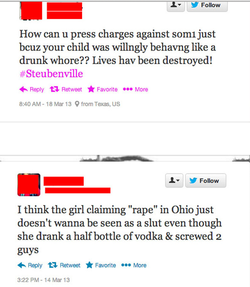I Completely Support the Stanford Rape Survivor - But Can We Please Stop Calling Her "Brave"?6/6/2016
Brock Turner (above) was caught raping an unconscious woman behind a dumpster at Stanford.
The conscience of everyone who has a moral compass was shocked this week when Brock Turner, who was caught in the act of sexually assaulting an unconscious woman, received a lenient six-month sentence. After being convicted of three felonies, including assault with intent to rape. This is not justice, and steps have already been taken to recall the judge responsible for the sentence, Aaron Persky. The victim, who has chosen to remain anonymous, released the letter that she read aloud to her attacker at the trial to Buzzfeed on June 3. By June 6, over 6.2 million people had read her 7,000+ word statement. (It's powerful. If you haven't, you should read it.)
I support her 100%. I support the movement to recall Aaron Persky 100%. And I support a much longer sentence for Brock Turner 100%.
But, honestly, I'm a little bothered by the fact that everyone keeps calling Jane Doe "brave" for coming forward and sharing her story. Like, does that mean the countless other women who didn't come forward aren't brave? I'm not denying that it took courage to face her attacker, to fight a year-long legal battle, or to share such intimate details about her horrifying experience, over and over again. I'm just questioning your word choice. I really don't like the implication that Jane Doe is braver than other survivors, or that she is brave and they are not. Because, look. If I say, "Engineers are smart," I don't mean, "Humanities majors and engineers are smart." I mean, "Engineers are smart." Likewise, if I say, "I drive a blue car," I don't mean, "I drive a blue car and a red car." I mean, "I drive a blue car.' So if I say, "The Stanford survivor is brave," I'm implying that other survivors are less brave -- or even cowards! -- because they didn't come forward. And that is simply not true. Why does this matter? Because hearing that this survivor is brave and you are not could be completely demoralizing to someone who has worked hard to put her life back together after a sexual assault. And also because coming forward isn't about bravery. It's about making the decision that is right for you -- and that decision is different for every survivor. Just consider how hard rape cases are to prosecute. And I'm not just talking emotionally. I mean legally, it's an uphill battle for the victim. Take Jane Doe's case, for example. Two witnesses who caught Brock Turner in the act. A police report. A rape kit that found dirt, debris and lacerations in her genitalia. A defendant whose testimony contradicts his original statement. Seems like a really straightforward case, right? Except the rapist refused to settle and hired a lawyer to assassinate her character and make things as unpleasant for her as possible. It was difficult for the jury not to convict him, given the evidence... But after all that, Brock Turner got off with a slap on the wrist. Six months, out of a possible fourteen years. There are few who would consider this justice. Now, think about a more typical rape. You're not going to have witnesses. The victim might not have thought to get a rape kit until it was too late. Or maybe she felt so disgustingly violated that she showered immediately after. She might not have the supportive friends, family or boyfriend Jane Doe did. You're going to have her word against his. You can still file charges. You can still try to get justice. But our system is so flawed, there is no guarantee the district attorney will even take your case to court. After a sexual assault, there is no brave or not brave. There is only survival. There is only trying to make the decisions that are best for you. One woman might decide that it is worth it to relive her painful experience over and over. She might decide she is willing to deal with lawyers, police and whatever social media backlash she might might face if she moves forward with this.
The twitterverse was not kind to the victim of the Steubenville, Ohio rapes -- even though there were multiple witnesses and photographic and video evidence.
To her, it might be worth being revictimized repeatedly over the course of a year -- maybe more -- only to learn that her attacker will walk. Because at least she tried. If that is the right decision for her, she should absolutely do that. But another woman might decide that the best way for her to begin recovering from her trauma... is to avoid thinking about it. She might decide it's not worth it to go through all that -- the benefit of seeing him maybe go to county jail for a few weeks isn't worth the personal cost of getting him there. She might want to focus on herself, her recovery, her career or her children, instead. She might have limited access to transportation (which is required to get to and from the court house), money (to pay for a lawyer), or time off of work. She might be a member of a group that has a strained relationship with the police. Imagine being a Black rape victim in San Francisco, in the midst of the SFPD corruption/bigoted text/killing of a homeless man controversies of the last year. According to Many women of color don't go to the police after being sexually assaulted - here's why, some Black women avoid reporting rapes because they feel their life depends on it. She might be so traumatized by what happened that she doesn't think it would be psychologically possible for her to talk about the rape ever again. Each of these women is making the decision that is right for her. But, to me, none of these survivors is "braver" than the others. Because it's not about bravery. It's about doing what makes the most sense for you. What do you want to do? How do you want to move forward? What is your decision, based on your context, your priorities and your life? One could argue that the woman who comes forward, even at a personal cost, is a hero -- if she didn't come forward, her rapist might have raped another woman. There is merit to that argument. You might also argue that Jane Doe's decisions will help the next generation of women -- surely, with all the media attention and outcry her case has sparked, things will be different in the future. I really hope that's true. But not everyone wants to be a hero. Not everyone wants to champion a cause or be the face of a movement. Some people just want to be who they were before they were assaulted. And that is perfectly fine. I admire Jane Doe for her perseverance, which I think will have a positive effect on the future. But is she "braver" than other survivors because of it? I don't think so. Her priority is justice, and I think she is making the decisions that are right for her -- just like all survivors are trying to do. And my hope for other survivors is that they know that. Something terrible happened to you. You did nothing to deserve that. The decisions you've made about how to move forward are your own, and I admire you for them. *** Want to know more? Check out:
5 Comments
claire
6/7/2016 11:02:54 am
Thank you. I was raped by my ex back at boarding school. He was popular and on the football team. My parents wouldn't have supported me and the whole school would have turned on me. I never reported it. Thank you for saying I'm not a coward.
Reply
Ariana
6/7/2016 11:47:14 am
It's not that I disagree with what you're saying in gist, but I think you could have said it better. All survivors are brave, you're right continuing on with your life is not a cowards choice, keeping going day after day is strong. However I don't think we should stop calling Jane Doe brave, we should just also call all other survivors brave as well.
Reply
6/7/2016 12:35:38 pm
Great point, and thanks for the feedback.
Reply
1/31/2022 06:48:24 pm
Nice content and informative. Rape is not really tolerable.
Reply
Leave a Reply. |
About the Author

Eva is a content specialist with a passion for play, travel... and a little bit of girl power. Read more >
Want to support The Happy Talent? CLICK HERE!
Or Find me on Patreon!
What's Popular on The Happy Talent:
Trending in Dating and Relationships:
What's Popular in Science: Playfulness and Leisure Skills:
Popular in Psychology and Social Skills:
Categories
All
|



























 RSS Feed
RSS Feed